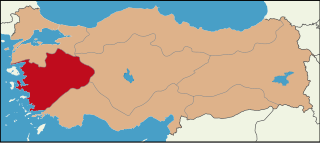
Turkish cuisine is largely the heritage of Ottoman cuisine, which can be described as a fusion and refinement of Central Asian, Middle Eastern, Eastern European and Balkan cuisines. Turkish cuisine has in turn influenced those and other neighbouring cuisines, including those of Southeast Europe (Balkans), Central Europe, and Western Europe. The Ottomans fused various culinary traditions of their realm with influences from Levantine cuisines, along with traditional Turkic elements from Central Asia, creating a vast array of specialities—many with strong regional associations.

The Aegean Islands are the group of islands in the Aegean Sea, with mainland Greece to the west and north and Turkey to the east; the island of Crete delimits the sea to the south, those of Rhodes, Karpathos and Kasos to the southeast. The ancient Greek name of the Aegean Sea, Archipelago was later applied to the islands it contains and is now used more generally, to refer to any island group.

İzmir Province is a province and metropolitan municipality of Turkey in western Anatolia, situated along the Aegean coast. Its capital is the city of İzmir, which is in itself composed of the province's central 10 districts out of 30 in total. To the west, it is surrounded by the Aegean Sea, and it encloses the Gulf of Izmir. Its area is 11,973 square kilometres, with a population of 4,279,677 in 2017. The population was 3,370,866 in 2000. Neighboring provinces are Balıkesir to the north, Manisa to the east, and Aydın to the south. The traffic code of the province is 35.

Aydın Province is a province of southwestern Turkey, located in the Aegean Region. The provincial capital is the city of Aydın which has a population of approx. 150,000 (2000). Other towns in the province include the summer seaside resorts of Didim and Kuşadası.

The Aegean dispute is a set of interrelated controversial issues for decades between Greece and Turkey over sovereignty and related rights in the area of the Aegean Sea. This set of conflicts has had a large effect on Greek-Turkish relations since the 1970s. It has twice led to crises coming close to the outbreak of military hostilities, in 1987 and in early 1996. The issues in the Aegean fall into several categories:

Söke is a town and a large district of Aydın Province in the Aegean region of western Turkey, 54 km south-west of the city of Aydın, near the Aegean coast. It had 68,020 population in 2010. It neighbours are Germencik from north-east, Koçarlı from east, Milas from south-east, Didim from south-west, Aegean Sea from west and Kuşadası from northwest.

The Aegean Region is one of the 7 geographical regions of Turkey.

The Marmara Region is a geographical region of Turkey.

The North Aegean islands are a number of disconnected islands in the north Aegean Sea, also known as the Northeast Aegean islands, belonging to Greece and Turkey. The islands do not form a physical chain or group, but are frequently grouped together for tourist or administrative purposes. To the south are the Dodecanese islands; and to the west are the Cyclades and Sporades islands.

Imia or Kardak is a pair of small uninhabited islets in the Aegean Sea, situated between the Greek island chain of the Dodecanese and the southwestern mainland coast of Turkey.
Turkey straddles two peninsulas: Anatolia in Asia and Thrace in Europe. The surrounding seas are the Black Sea, Sea of Marmara, Aegean Sea and Mediterranean Sea. But the number of gulfs in the north and the south (Mediterranean) is not high, because the mountain ranges lie more or less parallel to the coastline both in the north and in the south. The majority of bays are on the west, where the mountain ranges are perpendicular to the coastline.

Winifred Lamb was a British archaeologist, art historian, and museum curator who specialised in Greek, Roman, Anatolian cultures and artefacts.The bulk of her career was spent as the Honorary Keeper of Greek Antiquities at the University of Cambridge's Fitzwilliam Museum from 1920 - 1958. She was the first woman archaeologist involved in the British Anatolian excavations, and the Fitzwilliam museum states that she was a "generous benefactor and raising the profile of the collections through groundbreaking research, acquisitions and publications."
Blessed Thistle with Lamb is a dish common to the Aegean coast and Aegean sea islands among Turkish and Greek people. Ingredients include Blessed thistle, lamb chunks, onion, juice of half a lemon, flour, butter, and salt.
Mallow with lamb is a dish from the Aegean coast and Aegean Sea islands among both Turkish and Greek people.
Corn poppy with lamb this dish commonly used by Aegean coast and Aegean sea islands Turkish and Greek people.
Eggplant Papucaki is a typical Aegean dish found on both Turkish and Greek sides of the Aegean Sea. "Papuc" or "papuç" is a Persian word "paposh" (پاپٯش) that is used in Turkish and means shoe or slipper. The ingredients are eggplants, green peppers or bell peppers, green onions, tomatoes, lemon, olive oil, mozzarella or feta cheese, eggs, leaves, salt and pepper.
21.Peron was a Turkish progressive rock band in the 1970s. The band participated in the 1979 Eurovision Song Contest with a song called "Seviyorum". The band won in the elimination round; however, due to political concerns, the Turkish Republic decided not to attend the 1979 Eurovision Song Contest, which took place in Israel.











